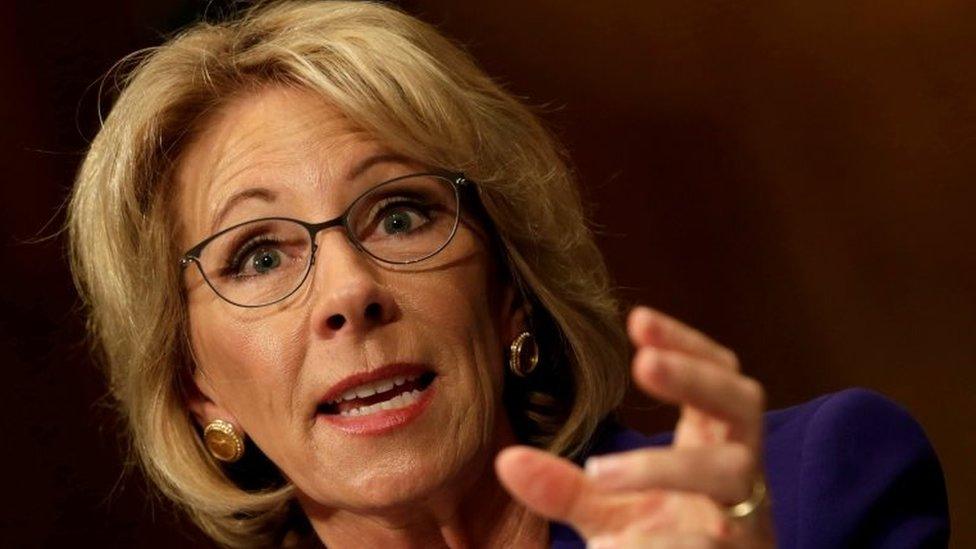Reality check: Is Donald Trump's cabinet facing historic obstruction?
- Published
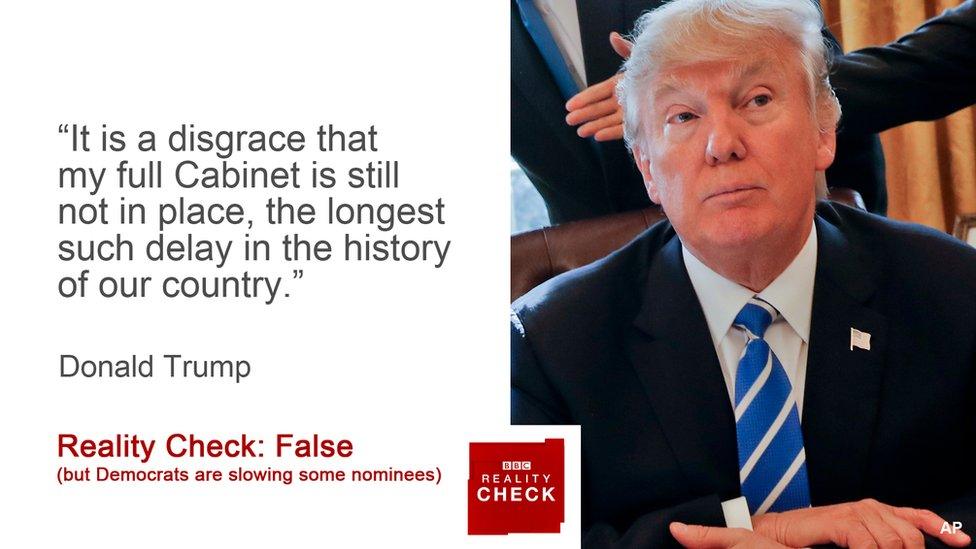
The claim: It has taken longer for Donald Trump to have his "full cabinet" confirmed than any president in US history.
Reality Check Verdict: Democrats have slow-walked many of Mr Trump's presidential nominations. It has taken longer so far for him to get the majority of his choices confirmed, although part of that is due to the lateness of a few nominations and delays in submitting background-check paperwork. Mr Trump still has months to go, however, before he sets a record for how long it has taken to have all his cabinet positions filled.

On 7 February Donald Trump tweeted, external that it was a "disgrace" that he did not have his full cabinet of top-level presidential appointments confirmed by the US Senate. He called it the "longest such delay in the history of our country" and blamed it on Democratic obstruction.
His message echoed comments made by other prominent Republicans in Congress and his own administration.
Press secretary Sean Spicer said the length of time it has taken to get Mr Trump's presidential nominations confirmed was "ridiculous".
"The Senate Democrats have done everything in their power to slow the work of the Senate, while the president continues to take decisive action, just like he promised," he said, external.
Senate majority leader Mitch McConnell said, external "Democrat obstruction has reached new extreme levels", which he called a "historic break with tradition".
"It's time to finally accept the results of the election and move on," he added.
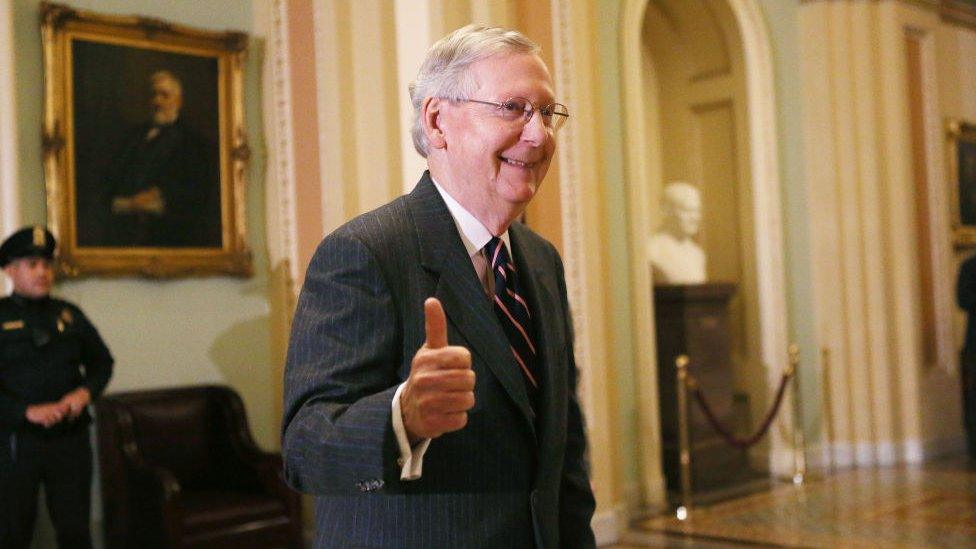
Do as I say, not as I do?
At its most basic level, Mr Trump's tweet about the historic nature of the delays in assembling his "full cabinet" is demonstrably false.
As of 8 February, Mr Trump has had six of his 15 cabinet selections confirmed by the Senate, with several more awaiting final Senate approval. While he still has a way to go before his entire team is in place, it's hardly historic at this point.
Bill Clinton didn't have his final spot filled until 11 March. Republican George HW Bush took until 17 March. Barack Obama holds the modern record, as his last pick - Health and Human Services Secretary Kathleen Sebelius - didn't get her Senate vote until 28 April.
Only George W Bush, who like Mr Trump won the presidency without securing a plurality of the popular vote, had his full team in place within weeks of his inauguration, following John Ashcroft's confirmation as attorney general on 30 January.
While Mr Trump's assertion is without basis in fact, he - and his fellow Republicans - are on firmer ground with a more general complaint about delayed confirmations.
Of the past five presidencies, Mr Trump has by far the fewest confirmed cabinet selections at this point. Only two of his nominees - Secretary of Defence James Mattis and Homeland Security Secretary John Kelly - were approved on inauguration day. Mr Clinton had three, Mr Obama had six, and George W Bush had seven. By mid-February, Mr Obama had all but three of his picks seated. Mr Clinton had all but one. George HW Bush was missing four.
Part of the reason it took so long to fit those last pieces into their cabinets is because those past presidents had to withdraw initial selections due to scandal or insurmountable political opposition. George HW Bush's defence pick, John Tower, was voted down by the Senate. Mr Clinton swung and missed twice on attorney general before settling on Janet Reno. Mr Obama withdrew commerce nominees twice and health and human services once.
So far, Mr Trump has stuck with his original picks - although labour secretary nominee Andrew Puzder has yet to complete his ethics review and has had his confirmation hearing delayed four times.
Puzder isn't the only one of Mr Trump's wealthy nominees who has had difficulty completing the Office of Government Ethics' vetting paperwork, which has contributed to confirmation delays. Education Secretary Betsy DeVos and Commerce Secretary Wilbur Ross were among those, external who were tardy in complying with background-check requirements.
Mr Trump was also remarkably slow to come up with several cabinet picks. He didn't announce Veterans Affairs nominee David Shulkin until 11 January. Agriculture pick Sonny Perdue was unveiled just two days before inauguration on 20 January - an astounding fact, considering of Mr Trump's four predecessors, only four original nominations came after New Year's Day (George HW Bush's energy pick James Watkins was the latest, on 12 January).
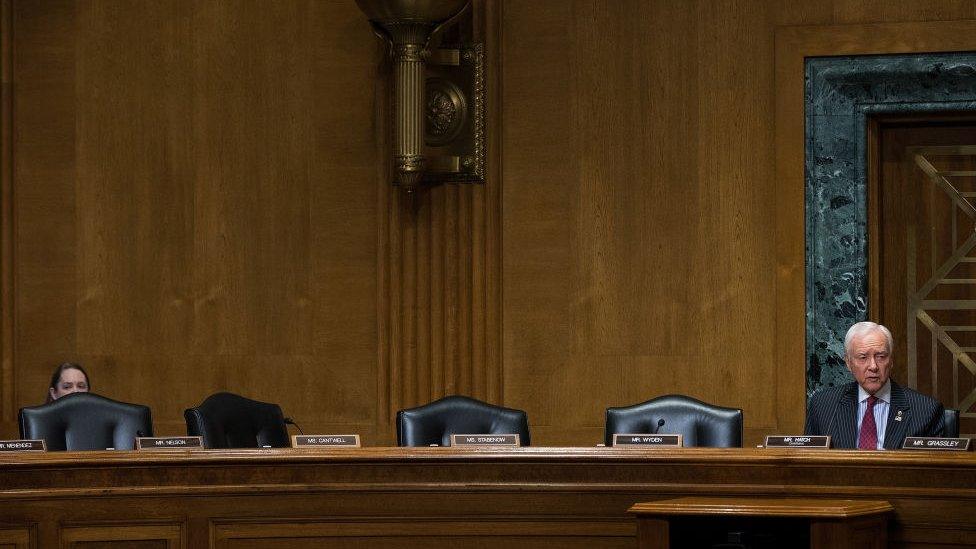
Empty Democrat seats during a committee vote on two cabinet nominee
This isn't to discount the obvious efforts Democrats have made to drag out the confirmation process for some Trump picks.
They staged walk-outs at committee hearings for health and human services nominee Tom Price and treasury's Steven Mnuchin, delaying approval votes by a day. They gave long speeches that held up votes for Mr Sessions in committee vote and Ms DeVos on the Senate floor.
They've used bits of arcane Senate procedure and parliamentary manoeuvres to gum up the works where they can - although, due to their minority status, they can only delay, not derail.
Although the efforts have been futile, Democratic senators are voting "no" on Mr Trump's nominees at an increasingly higher rate. More Democrats cast votes against Ms Devos than all previous education secretaries combined, dating back to the position's creation in 1980.
There have been a total of 111 no votes in the five nominees who have come up for a full Senate vote so far - compared with only 18 in the entirety of Mr Clinton's presidency. Mr Obama's choices had 406 no votes, but that was over the course of eight years and 31 nominations.
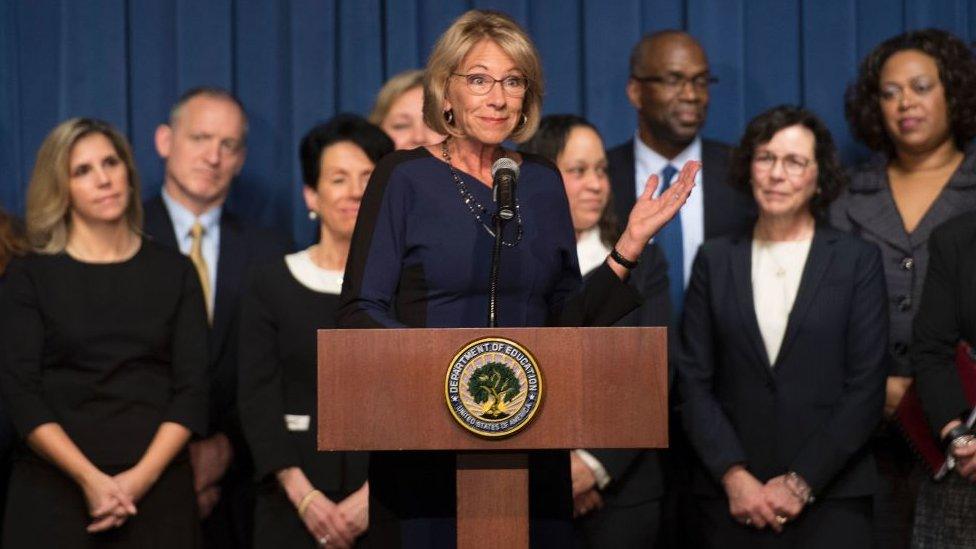
Betsy DeVos confirmation took Vice President's Pence tiebreaker vote
Democrats have also pumped up the anti-Trump rhetoric, throwing red meat to a Democratic base that is furious at any signs of compromise or accommodation.
"If not total unanimity, we're going to have near Democratic unity in opposing the remaining nominees for President Trump's cabinet," Senate Minority Leader Charles Schumer said on Monday. "This unity makes clear just how bad this cabinet would be for America's middle class and those struggling to get there."
While Republicans cite statements like Schumer's as examples of unprecedented Democratic intransigence, Democrats are quick to note that in the latter days of the Obama administration, conservatives were equally vigorous in their opposition to the president's selections.
Merrick Garland, whose Supreme Court nomination languished for 10 months before expiring without a hearing, is foremost in their minds, but even Mr Obama's second-term cabinet picks faced record-breaking delays.
His choice for labour secretary, Thomas Perez, took 121 days to be confirmed. John Bryson, his commerce pick, waited 126 days. Attorney General Loretta Lynch holds the modern record, as 161 days passed before getting Senate approval.
If a Trump nominee had that sort of delay, he or she wouldn't assume office until well into June.



- Published7 February 2017
- Published15 December 2018
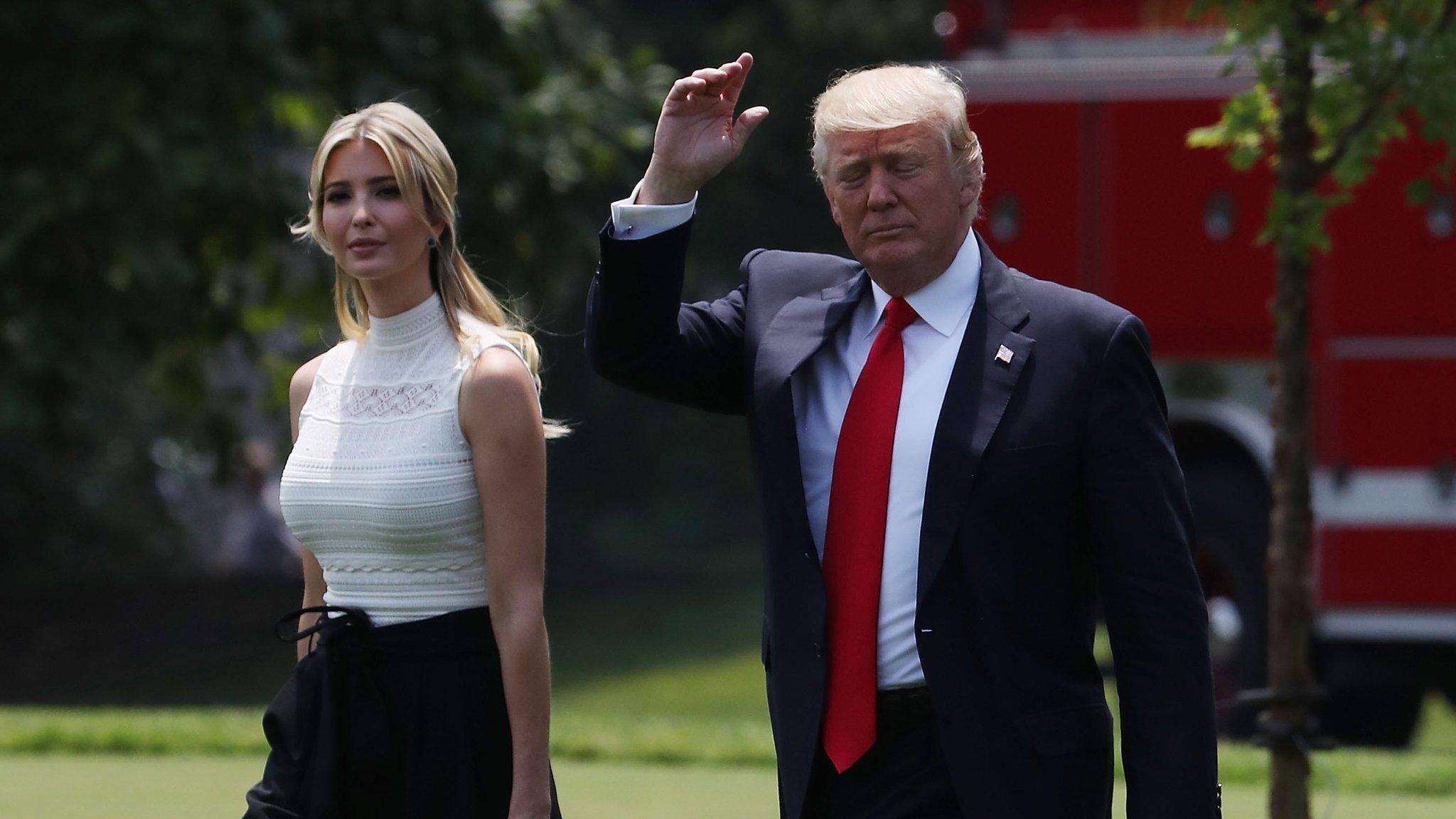
- Published7 February 2017
